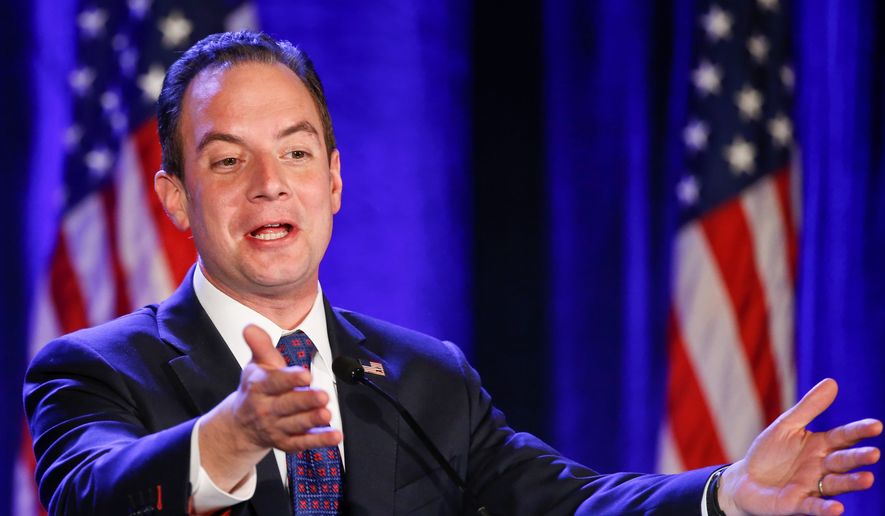Voters hit the stop button on the advance of social liberalism Tuesday in some high-profile races, rejecting a transgender discrimination ban in Houston and marijuana legalization in Ohio, in off-year elections that left conservatives claiming more victories.
Republicans took the two and only gubernatorial contests on the ballots. The re-election of Mississippi Gov. Phil Bryant was almost a foregone conclusion, but Kentucky’s Matt Bevin stunned onlookers with his trouncing of Democratic Attorney General Jack Conway by 53 percent to 44 percent.
Add those victories to the Virginia Republicans’ big night in holding its two-seat majority in the state Senate, and “I don’t think the Dems picked up the kind of momentum they thought they might,” said Republican political strategist Diana Banister.
White House spokesman Josh Earnest was quick to reject suggestions that President Obama or Obamacare was to blame for helping Republicans, although both were prominent themes in Mr. Bevin’s gubernatorial campaign.
Mr. Earnest noted that Kentucky and Mississippi are red states and said Democrats did well in blue states such as New Jersey and Pennsylvania. All three open seats on the Pennsylvania Supreme Court went to Democrats.
“We’d be reluctant to draw significant conclusions” from Tuesday’s results, Mr. Earnest said.
Meanwhile, Republican National Committee Chairman Reince Priebus was happy to draw conclusions. He described the Republican wins in Kentucky, Mississippi and Virginia as “another rebuke of President Obama and his policies Hillary Clinton would only continue.”
“Our party heads into the 2016 election with positive momentum and with the right vision to put our country back on track,” Mr. Priebus said in a statement.
Elsewhere, Houston Mayor Annise Parker lost by 61 percent to 39 percent in a heated ballot fight over transgender restroom access. San Francisco Sheriff Ross Mirkarimi was sent packing in an outcry over a sanctuary city that was apparently too progressive even for the Bay Area.
Ohio voters snuffed a marijuana legalization measure, although the defeat was blamed largely on the wording of the initiative, which drew cries of cronyism by creating a cultivation monopoly for 10 investors.
Those votes on high-profile social issues, combined with Mr. Bevin’s runaway win, were considered hopeful signs for social conservatives.
“There is a lesson to be learned: Conservatives can win when they refuse to be bullied by elites into silence,” Heritage Foundation senior research fellow Ryan T. Anderson said in The Daily Signal. “Making the public argument against bad policy and in support of good policy can win the day. It just did.”
A businessman who had never been elected to public office, Mr. Bevin embraced social issues in his campaign. He came to the defense of Rowan County clerk Kim Davis, who refused to issue marriage licenses to same-sex couples, and pledged to defund Planned Parenthood.
“He ran on social issues in the Kentucky race and won,” said Ms. Banister, president of Shirley & Banister Public Affairs. “Everyone tells us, ’You can’t be for social issues, and you certainly can’t run on social issues,’ and he showed that you can. That, to me, was a significant thing that happened last night, and I’m hopeful that’s a trend.”
Mr. Bevin also promised to fight the Obama administration’s regulatory squeeze on the coal industry and to dismantle Kentucky’s limping Obamacare exchange.
In response, Mr. Earnest said Mr. Bevin stated only days ago that “nobody’s losing anything” under the state’s Medicaid expansion.
“Vowing to repeal the Affordable Care Act in some cases has been used as an effective political strategy, but it’s not a terribly effective governing strategy,” Mr. Earnest said.
Also in Kentucky, Republican Jenean Hampton made history by becoming the first black candidate, Republican or Democrat, male or female, to win statewide election. She won her race for lieutenant governor on the Republican ticket with Mr. Bevin.
Before Tuesday’s balloting, Democrats had lost 910 seats in statehouses nationwide since Mr. Obama took office in 2009. Republicans currently control 56 percent of all state legislative seats.
Mr. Earnest said that is not a reflection on Mr. Obama but “obviously, the president would like to see Democrats do better.”
In other races, voters showed they were willing to approve spending initiatives as long as they were specific. In Colorado, for example, voters passed Proposition BB, which allows the state legislature to keep a pot-driven tax refund for drug education and school construction.
In Pueblo County, voters approved by 60 percent to 40 percent a 5 percent excise tax on marijuana growers. The plan is to raise $3.5 million by 2020 to fund scholarships to the county’s public colleges or universities in what have been described as the nation’s first “weed scholarships.”
Voters in Portland, Maine, rejected an initiative to raise the minimum wage to $15 per hour. Across the continent in Tacoma, Washington, voters agreed to a measure to raise the city’s minimum wage to $12 per hour, but nixed a proposal that would have increased it to $15 per hour.
• Dave Boyer can be reached at dboyer@washingtontimes.com.
• Valerie Richardson can be reached at vrichardson@washingtontimes.com.




Please read our comment policy before commenting.